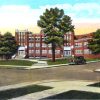calsfoundation@cals.org
Ethel Beatrice Ross Dawson (1907–1984)
Ethel Dawson was a civil rights leader in Lincoln County who emphasized the necessity of self-sufficiency and political independence among African Americans. She held various roles during her career, including serving as a home demonstration agent, holding a leadership role in the National Council of Churches of Christ in the United States of America, and working with the Student Nonviolent Coordinating Committee.
Ethel Beatrice Ross was born on a farm in Lincoln County in 1907. She married Oscar G. Dawson on May 6, 1933; they had no children. She graduated from Arkansas AM&N College (now the University of Arkansas at Pine Bluff) in 1940 with a degree in home economics and began serving as a home demonstration agent in Gould (Lincoln County) the following year. She held this position until 1944 before becoming a home economics instructor at Merrill High School in Pine Bluff (Jefferson County), where she stayed until 1946. Dawson also pursued graduate work at New York’s Columbia University, the University of Chicago, Northwestern University, and the University of Arkansas (UA) in Fayetteville (Washington County). She began working for the National Council of Churches of Christ in the United States of America (NCC) in 1946, which intensified her civil rights activism among rural African Americans through her work in Lincoln County’s sharecropping program.
Dawson encouraged agrarian Blacks to engage in political self-sufficiency, both despite and because of their impoverished circumstances. As she recalled, “We were always encouraging people to pay their poll taxes and vote.” In 1947, as the Arkansas director of religious extension service for the NCC Home Missions Division, Dawson addressed the poor treatment rural Blacks endured at the National Conference of Church leaders at the Tuskegee Institute in Alabama. Skillful at harnessing Cristian women’s energy to aid her work, Dawson was further an instructor at the 1947 Institute of Rural and Town Women in Jackson, Tennessee, which was sponsored by the Home Missions Council under the auspices of the Phillips Theology School. She was additionally connected to Christian women through her membership in the United Council of Church Women (UCCW), an interracial and interdenominational organization. Informed by its mandate to fight racial injustice, Dawson attended the UCCW’s fourth biennial meeting in Milwaukee, Wisconsin, where representatives from around the country unanimously endorsed a resolution to end segregation in the armed forces.
By 1950, Dawson had become the NCC Division of Home Missions state director and the assistant secretary of the Pine Bluff National Association for the Advancement of Colored People (NAACP). She utilized Christian doctrine to justify rural activism and to persuade African Americans to pursue other vocations, given that agriculture was becoming increasingly mechanized. Dawson built bridges between Black and white organizations so they could act cooperatively as “Christian citizens” and leaders to address community issues and concerns.
Dawson was particularly outspoken about the disrespectful behavior Black women endured and, in 1951, lambasted the Pine Bluff Commercial for addressing them by their first names while referring to white women as “Ms.” or “Mrs.” In 1954, she again wrote to the newspaper decrying the lack of restrooms for African Americans who patronized Pine Bluff businesses. Dawson highlighted these and other issues as a member of the Arkansas Division of the Southern Regional Council (SRC). In 1954, when the Arkansas Division was reorganized as the Arkansas Council on Human Relations (ACHR), Dawson was elected secretary and served on the board of directors with such individuals as Daisy Bates and Arkansas Farm Bureau Federation Negro Division president John Gammon Jr. While on the board, she called attention to the injustices and economic competition Black agricultural laborers faced when white farmers began using Hispanic laborers known as “braceros.”
Dawson addressed African Americans’ concerns about the over-policing of Black communities and imparted political education across racial lines. In 1955, she attended a Civic Service Commission meeting to discuss police brutality, helped organize the Pine Bluff Council on Human Relations, and was an Arkansas Democratic Voters Association member. Dawson hosted community seminars during which she taught about “the Bible and Human Rights” and showed such films as The Christian Citizens. In doing so, she worked closely with women through such organizations as the Jefferson County Council of Church Women, the Lincoln County Civic Association, and the Progressive Women’s Voters Association (PWVA), which she helped to establish in 1953.
Dawson left the NCC in 1956 but increased her civil rights activism by working with the Student Nonviolent Coordinating Committee (SNCC) when SNCC first arrived in Arkansas in 1962. She and other women supported SNCC’s activists by raising funds from local churches and providing food and clothing during sit-ins and posting bail when students were arrested. In 1965, Dawson ran unsuccessfully for a seat on the Pine Bluff school board. She continued to work with the Jefferson County Voters Association, the League of Women Voters, and the NAACP to encourage rural people to register to vote. Dawson’s labors for African Americans’ political and economic access lasted until her death in 1984.
For additional information:
Jones-Branch, Cherisse. Better Living By Their Own Bootstraps: Black Women’s Activism in Rural Arkansas, 1914–1965. Fayetteville: University of Arkansas Press, 2021.
Pierce, Michael. “‘Boss Man Tell Us to Get North’: Mexican Labor and Black Migration in Lincoln County, Arkansas, 1948–1955.” In Race, Labor, and Violence in the Delta: Essays to Mark the Centennial of the Elaine Massacre, edited by Michael Pierce and Calvin White. Fayetteville: University of Arkansas Press, 2022.
Cherisse Jones-Branch
Arkansas State University
 Civil Rights and Social Change
Civil Rights and Social Change Education, Elementary and Secondary
Education, Elementary and Secondary World War II through the Faubus Era, 1941 through 1967
World War II through the Faubus Era, 1941 through 1967



Comments
No comments on this entry yet.